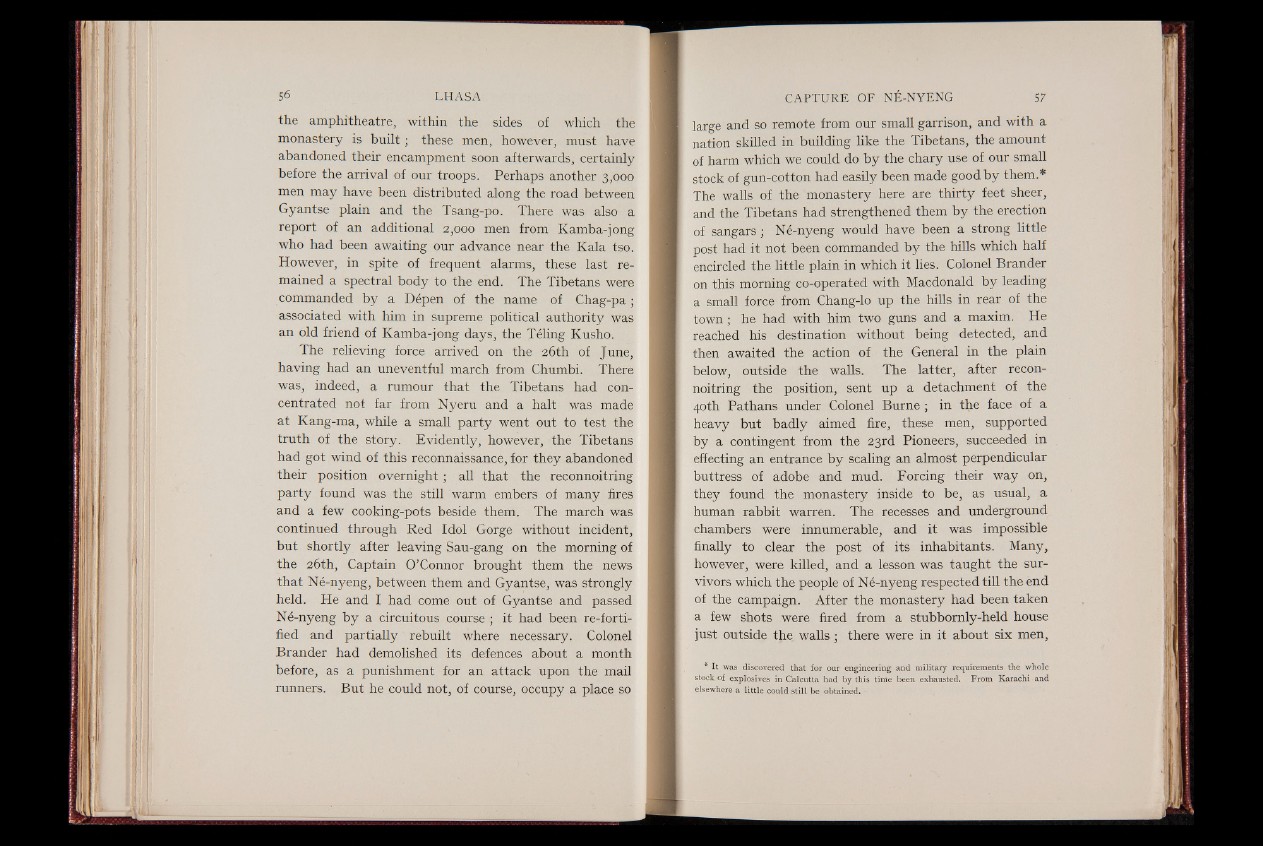
the amphitheatre, within the sides of which the
monastery is built ; these men, however, must have
abandoned their encampment soon afterwards, certainly
before the arrival of our troops. Perhaps another 3,000
men may have been distributed along the road between
Gyantse plain and the Tsang-po. There was also a
report of an additional 2,000 men from Kamba-jong
who had been awaiting our advance near the Kala tso.
However, in spite of frequent alarms, these last remained
a spectral body to the end. The Tibetans were
commanded by a Dépen of the name of Chag-pa ;
associated with him in supreme political authority was
an old friend of Kamba-jong days, the Téling Kusho.
The relieving force arrived on the 26th of June,
having had an uneventful march from Chumbi. There
was, indeed, a rumour that the Tibetans had concentrated
not far from Nyeru and a halt was made
at Kang-ma, while a small party went out to test the
truth of the story. Evidently, however, thè Tibetans
had got wind of this reconnaissance, for they abandoned
their position overnight ; all that the reconnoitring
party found was the still warm embers of many fires
and a few cooking-pots beside them. The march was
continued through Red Idol Gorge without incident,
but shortly after leaving Sau-gang on the morning of
the 26th, Captain O’Connor brought them the news
that Né-nyeng, between them and Gyantse, was strongly
held. He and I had come out of Gyantse and passed
Né-nyeng by a circuitous course ; it had been re-forti-
fied and partially rebuilt where necessary. Colonel
Brander had demolished its defences about a month
before, as a punishment for an attack upon the mail
runners. But he could not, of course, occupy a place so
large and so remote from our small garrison, and with a
nation skilled in building like the Tibetans, the amount
of harm which we could do by the chary use of our small
stock of gun-cotton had easily been made good by them.*
The walls of the monastery here are thirty feet sheer,
and the Tibetans had strengthened them by the erection
of sangars ; Ne-nyeng would have been a strong little
post had it not been commanded by the hills which half
encircled the little plain in which it lies. Colonel Brander
on this morning co-operated with Macdonald by leading
a small force from Chang-lo up the hills in rear of the
town; he had with him two guns and a maxim. He
reached his destination without being detected, and
then awaited the action of the General in the plain
below, outside the walls. The latter, after reconnoitring
the position, sent up a detachment of the
40th Pathans under Colonel Burne ; in the face of a
heavy but badly aimed fire, these men, supported
by a contingent from the 23rd Pioneers, succeeded in
effecting an entrance by scaling an almost perpendicular
buttress of adobe and mud. Forcing their way on,
they found the monastery inside to be, as usual, a
human rabbit warren. The recesses and underground
chambers were innumerable, and it was impossible
finally to clear the post of its inhabitants. Many,
however, were killed, and a lesson was taught the survivors
which the people of Ne-nyeng respected till the end
of the campaign. After the monastery had been taken
a few shots were fired from a stubbornly-held house
just outside the walls ; there were in it about six men,
* It was discovered that for our engineering and military requirements the whole
stock of explosives in Calcutta had by this time been exhausted. From Karachi and
elsewhere a little could still be obtained.